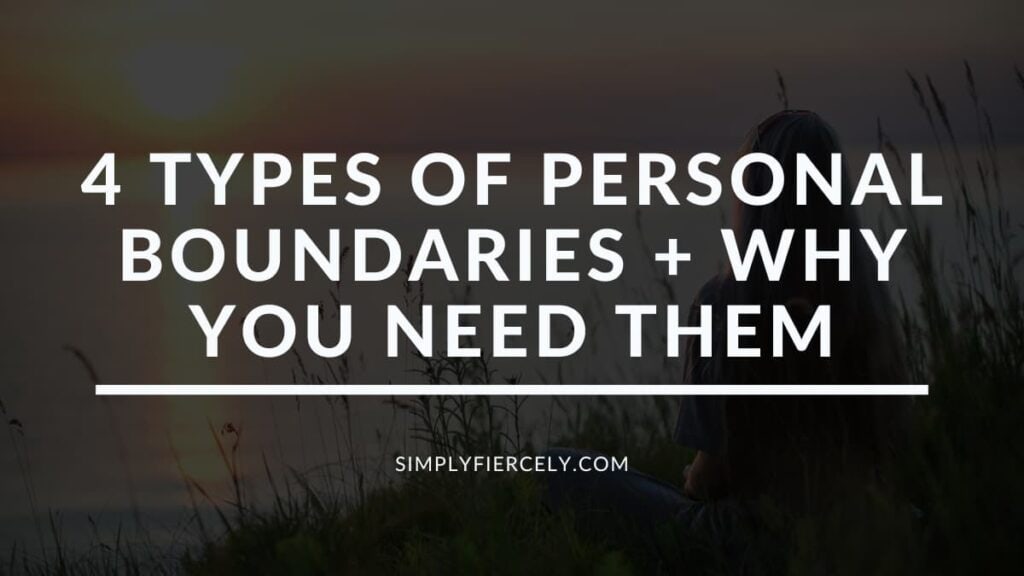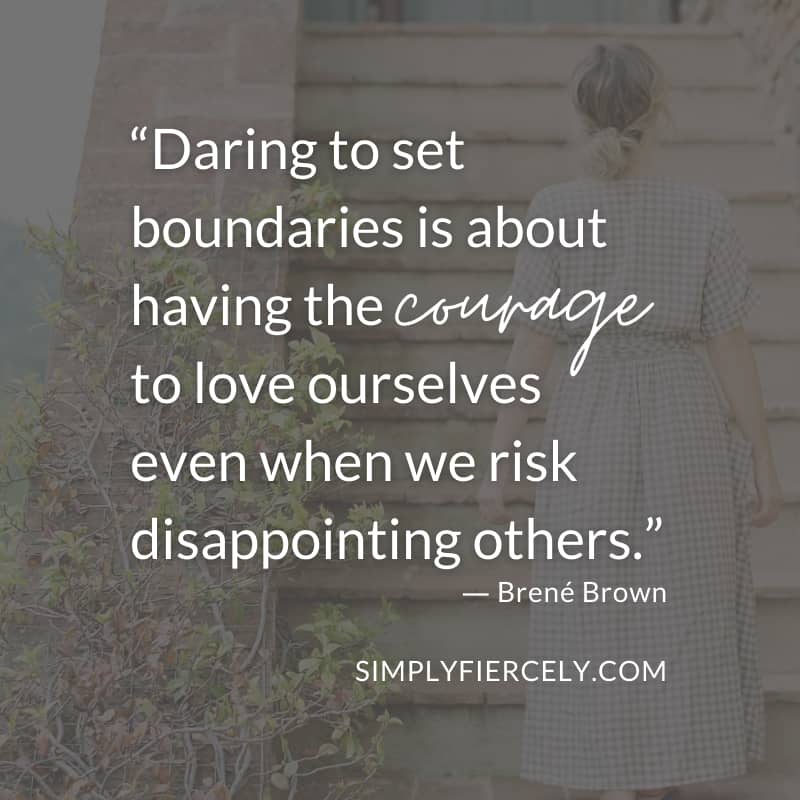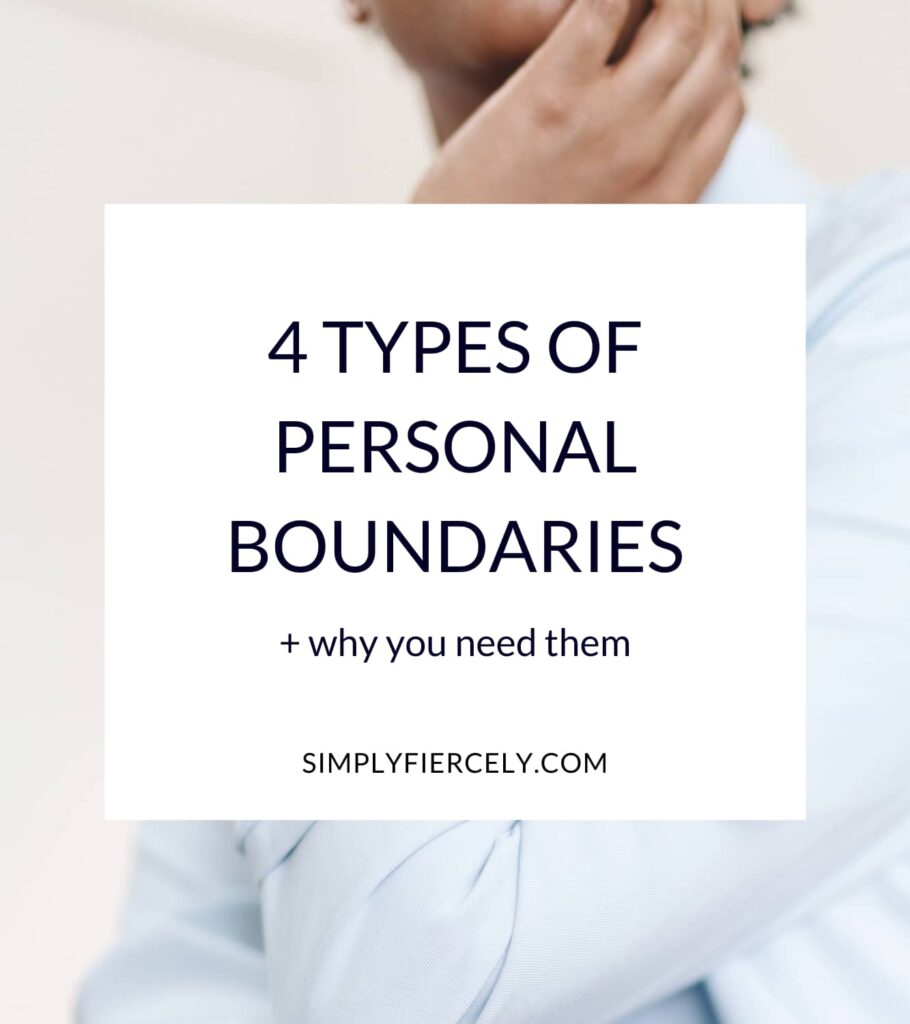Personal boundaries are a way of protecting our time, space and energy. Usually, it’s a limit that we set between ourselves and others, but I often find it helpful to set boundaries for myself as well.
In this blog post, I’ll explore four different types of personal boundaries that I’ve established in my life (physical, mental, time, and financial), why they matter, and where to start with setting your own.

What Are Personal Boundaries?
Personal boundaries are limits that help us honour our values and priorities, and they’re arguably more important than ever.
Slowly but surely, expectations are rising. We feel like we have to do more, be more, own more, buy more—and it’s all too much. As we struggle to keep our heads above water, the things that matter get pushed to the wayside.
Strong personal boundaries are a way of cutting out some of the noise. When we make intentional decisions about things like our time, money, environment and relationships, we’re not being difficult, selfish or unkind.
Instead, we’re simply drawing a line in the sand, deciding what matters, and taking steps to align our lives accordingly.
Related Post: 4 Practical Steps To Creating An Intentional Life

4 Types of Personal Boundaries + Why They Matter
There are many types of personal boundaries and different ways of classifying them. The following is not an exhaustive list, but it is a personal one.
These four types of boundaries have made a significant impact on my life, and I hope they inspire you to get curious and experiment with setting limits for yourself.
Physical Boundaries
Physical boundaries are limits that relate to space and our environment. Sometimes they are quite personal. For example, you might need to tell someone that you prefer to shake hands instead of hugging when saying hello.
I believe these types of boundaries are non-negotiable, but fortunately, I’ve not experienced too many situations where I’ve had to enforce them. If that’s not the case for you, I hope you’re able to get the support you need.
But I also want to point out that there are other ways we can set physical boundaries, with others and ourselves. Here are a few examples:
- limits on how many things we own – this might look like making an intentional decision about something as simple as how many towels to keep or limiting toys to what fits easily in the playroom
- limits on the type of things we own – you might choose not to buy fast fashion or single-use plastics if that aligns with your values
- limits to what people can bring into your home – you might ask someone not to smoke in your home or not to bring unhealthy snacks for your children
These are just a few examples and to be clear, I’m not here to pass judgment on your boundaries. What’s important is that you think about what matters most to you, and then ask yourself: how can I best protect my space and environment?
Decluttering is a tool that can help you enforce physical boundaries in your home. If you need help letting go, be sure to download my free Mindful Decluttering guide.
Mental Boundaries
Mental boundaries can be harder to explain because we can’t always see when a line has been crossed—but we all know how it feels. There’s a tightening in the chest and all-consuming thoughts that you just can’t shake.
Of course, sometimes tough feelings are healthy and inevitable. But as with all things, we have limits. You should be saving your emotional energy and mental strength for things that matter and not unnecessary drama.
For example, if reading certain magazines or browsing social media sends you into a spiral of insecurity and self-doubt, then maybe you need to set limits on the media you consume.
On a similar note, if you have a friend who is always talking about weight loss and dieting, and this makes you feel anxious about your eating habits, then you might want to ask them to avoid the topic around you.
Here are some personal examples of how I set mental boundaries:
- I have someone review my blog comments – I’m open to hearing different opinions, but personal attacks (or even threats of violence!) cross the line. Having someone delete inappropriate comments before I have to see them has been a huge relief.
- I don’t watch war movies and I ask others not to watch them around me – A loved one died while serving in a combat zone, so I find these films very uncomfortable.
- I use rules to filter my inbox – This might not sound like a mental boundary in the traditional sense, but using automation to organise my emails gives me greater control about when and if I respond. This is weight off my mind.
If you’re not sure what mental boundaries you need, start paying close attention to your emotions. If something is mentally draining, ask yourself is this a good use of your time and emotional energy. If not, what can you do to prevent this in the future?

Time Boundaries
Time boundaries are limits to how you spend your time and honestly, I find this one of the toughest to enforce. There are several reasons for this:
- people-pleasing – When we’re afraid of letting other people down, we say ‘yes’ to helping others even when we’re already stretched to our limits.
- the planning fallacy – This is a cognitive bias that leads to underestimating how long it will take to do things. In other words, we have a natural tendency to bite off more than we can chew.
- busyness culture – We live in a world where it’s easy to confuse productivity with self-worth. There’s internal and external pressure to always be doing more.
So what can we do? Set boundaries, of course. This might look like saying ‘no’ more often, or if that’s not comfortable, at least reducing the time we have available for others.
I know that for many people, that feels uncomfortable (“I don’t want people to think I’m selfish!“), but remember that setting boundaries doesn’t automatically mean never helping. Instead, it’s about deciding in advance how you can help, in a way that aligns with your values, priorities and strengths.
For example, you might say ‘no’ to spending an entire afternoon househunting with a friend but then spend a hour looking for options online because you have excellent research skills. You can protect your time while still providing value (when it makes sense to do so).
Here are some simple ways that I set time boundaries in my life:
- Requests – If it’s not urgent (according to my priorities), I reply and give myself a generous timeframe to take action. For example, “Thank you—I’ll have time to action this early next week.”
- Phone use – I’m not perfect, but I try to maintain a strong boundary by not sleeping next to my phone. I charge it across the room so I don’t feel tempted to check it first thing in the morning.
- “Don’t do” time blocks – I set rules about when I will or won’t do things. For example, I don’t clean when my children nap. I decided this early on and it allows me to rest during this time, without constantly feeling guilty about housework.
Financial Boundaries
Financial boundaries can look like creating a budget, deciding not to buy certain things, or setting limits for purchases. Here are some examples:
- Having a savings account that you don’t touch except for emergencies
- Setting limits to how much you’ll spend on Christmas gifts (or deciding not to exchange gifts)
- Creating a budget for charitable donations and making intentional decisions about the causes you want to support
- Asking friends to do free activities instead of expensive ones
As a reformed shopaholic turned minimalist, the financial boundary that has most helped me is avoiding impulse purchases. Instead, I keep a “want to buy” list and I wait at least 24 hours before buying anything over $20.
Related Post: 4 Reasons Why You Can’t Stop Shopping + What To Do About It
How to Set Personal Boundaries
In most cases, I think the easiest way to get started is to start small. Identify one area of your life where you need stronger boundaries and take a tiny step in a new direction. Start by saving $5 a week, going to bed 15 minutes earlier, or by having one tough conversation.
It might not feel like much at first, but I think it’s more important to set small boundaries and maintain them than to set big boundaries and not following through. You need to prove to yourself and others that your limits are to be respected.
The exception would be if you’re in a dangerous or toxic situation. Sometimes you need to go big with bold boundaries in order to protect yourself.
Either way, it’s important to be consistent and to re-evaluate your boundaries often. Sometimes our needs and priorities change, and your boundaries should adjust accordingly.
Do you have strong personal boundaries? What type has had the biggest impact on your life? Let us know in the comments!



Wow which sad people give you hate comments for decluttering your life? Go on strong girl
Oh you’d be surprised! 😂 The Internet is a funny place. Thanks for your support!
Wow which sad people give you hate comments for decluttering your life? Hoarders? Go on strong girl
I love this post! I have recently been reading Michelle Elman’s book – The joy of being selfish – which is all about boundaries. I was never taught how to set boundaries (in any form) and in fact made to feel selfish (in a bad way!) if I did dare to say no or do things for myself as I grew up. Through reading Michelle’s book and seeing posts like yours, it is essential that we all learn to set our boundaries as we see fit (even if it doesn’t suit others!)
I ask my friends and those I counsel too, to call between 10am and 8pm….no earlier, and no later, unless it’s an extreme emergency. I also have the option of turning off my phone if I need some space for myself with no calls. I also ask them to text first to see if I am free during that time. I have learned alot from you! thanks!
You have a great deal of self knowledge, that’s so valuable in terms of living a happy and meaningful life. I think many people never spend much time trying to determine what their true values are and that interferes with their boundary setting. I think that sometimes people exclude themselves from life changing experiences by putting the boundaries in the wrong place. I always made it a practice to think through why I didn’t want to do something. If the reasons were valid then I’d say no, but sometimes I realized it was just fear stopping me, and if that is what it was I’d make myself say yes, and that absolutely changed my life in terms of personal growth. Great post!